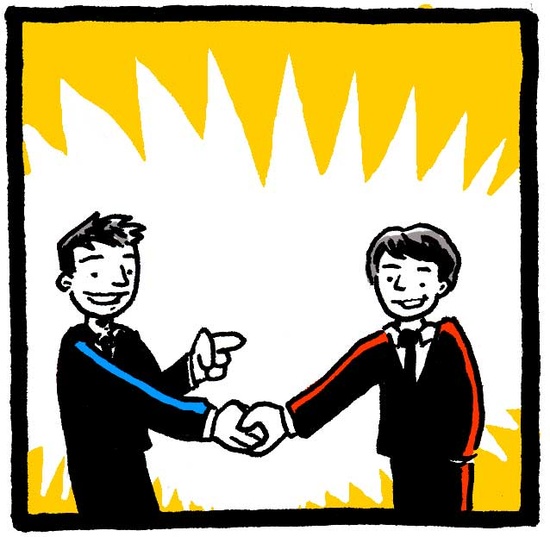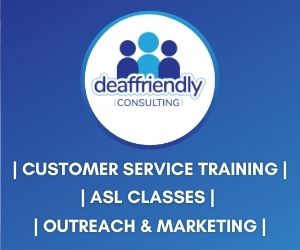Do You Know What It Means To Be #deaffriendly?
Posted by: Staff Writer on Sept. 22, 2014

You know what a cost-benefit analysis is. You have your accountant’s telephone number on speed-dial. You even know how to expertly run a social media campaign on Facebook and Twitter. But, do you know what it means to be a deaf-friendly business?
Deaf-friendliness can mean different things to different people. Some perceive it emotionally, such as effortless empathy from hearing people who intuitively know how to meet our needs. Others see it as providing accessibility through communication or technology needs. As a bare minimum, deaf-friendliness includes eye contact, clear speech, patience, and willingness to accommodate a variety of communication needs. Contrary to popular opinion, deafness is not absolute: It has a stunningly wide range of sound perception.
This variation is why accommodation needs also vary widely amongst those in the deaf, deaf-blind and hard of hearing (hh) community. Here is a running list of a few accommodation requests and needs that you, as a business owner, may get from your deaf or hh customers and clientele:
Enunciation for Speech-reading (previously known as lip-reading)
When footballer Zinedine Zidane made his infamous head-butt at the 2006 World Cup, professional speech-reader Jessica Rees made the spotlight for speech-reading the words of Zidane’s provoker. It certainly is true that some deaf/HH people develop an ability to “guesstimate” speech visually. University of Manchester researchers found that deaf/HH people using their residual hearing only understood 21% of speech. But comprehension goes up to 90% if they combine residual hearing with both hearing aids and speech-reading.
Never underestimate the importance of making continual eye contact, and moving your lips at a pace that is easy to follow. If you run a restaurant, be sure to have a few extra lamps or candles in your stock room. The “dim, romantic lighting” at many upscale eateries is anything but romantic for deaf diners struggling to speech-read!
Also, remember that the speech-reading is hardly a cure-all, and it can be too easy to overestimate how well the average deaf/hh person can speech-read. “Studies show that only 23% of hard of hearing people become effective speech-readers,” writes director of the Center for Hearing Loss Center Neil Baumann, Ph.D. “That means that whopping 77% need to use other means of coping along with speech-reading.”
For more details on what the other 77% may need from your business, read on.
Use Pen and Paper
If speech reading is not a preferred communication method for your deaf/hh client or customer, paper and pen can be your low-tech, high-efficiency savior. This combo can be especially useful if the deaf customer is in a crowded, noisy venue with dim lights or a distracting environment. It can also be a literal lifesaver if the message is health-related: For example, a vegan in a Chinese restaurant who wants to be sure that a drink is soy-based, or someone with severe peanut allergies who cannot risk an ambiguous order.
Hire a Sign Language Interpreter
What if your business offers a service that is lengthier than a brief transaction like ordering a martini, “shaken not stirred?” You may teach an hourly cooking class, provide magic show entertainment that is open to the public, or you may have a private practice as a physician. In all of these cases, it may be necessary to hire a Sign Language interpreter - someone trained in this visually interactive language to help facilitate communication.
Offer and Update Technology
Depending on your business infrastructure, you may find that some deaf consumers require more complex accommodations in order to get the most out of the service or product you offer. Technology is quickly becoming a powerful toolkit for the deaf/hh to get the most out of their daily lives – including entertainment events, careers and personal relationships. The upgrades and pace of change can be astounding.
If you have been accustomed to offering TTYs (teletypewriters), for example, you may quickly begin to realize that very few in the deaf/hh community actually use these anymore. Here are just a few examples of different technologies that different businesses need to be aware of:
Apartment Complexes: If you are a building manager, you will be required by the Americans with Disabilities Act (ADA) to honor requests for apartments to be retrofitted with blinking strobe lights. This enables deaf tenants to be visually alerted in the case of a fire alarm.
Cinemas/Theatres: Your patrons would hugely benefit in having your theatres retrofitted with Rear Window® captioning. This is a technology that presents film captions through a large LED display mounted on a real wall that displays words in mirror image.
Schools and Universities: Under the Americas with Disability Act (ADA) all Title IV schools are mandated to provide accommodations for deaf/HH students. While some students may simply require a note-taker, others prefer Sign Language Interpreters, Cued Interpreters and still others (particularly those who may not be fluent in Sign Language) require Computer Assisted Real-time Transcription (CART).
Hotels/Lodging: Your guests will require the same accessibility as your hearing guests. Their room will need to be retrofitted with a strobe light in the event of a fire, a way for them to place telephone calls such as a TTY or Videophones, as well as a vibrating alarm clock and visual door signal.
Whatever individual needs are, deaf-friendliness is not something businesses can afford to skimp on. According to the U.S. Census Bureau, approximately 38 million Americans have some degree of hearing loss. Not providing a deaf-friendly environment translates to neglecting over 12% of the population.
Bottom Line: If you are unsure what accommodations your deaf/hh clients and customers prefer, ask them! More often than not, they can tell you what their exact communication needs are. Even better, they will appreciate your thoughtfulness and willingness to be adaptable.
Tags
- deaf
- hard of hearing
- deaf friendly
- american sign language
- deaf business
- business
- deaf challenged
- tips




Comments